如何用英文跟外国医生交流,一定要懂它们!
第一次海外就医与医生电话英语沟通流程
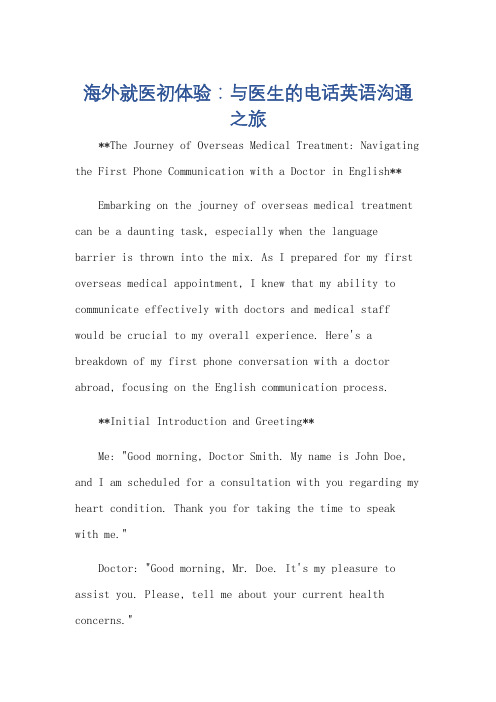
海外就医初体验:与医生的电话英语沟通之旅**The Journey of Overseas Medical Treatment: Navigating the First Phone Communication with a Doctor in English**Embarking on the journey of overseas medical treatment can be a daunting task, especially when the languagebarrier is thrown into the mix. As I prepared for my first overseas medical appointment, I knew that my ability to communicate effectively with doctors and medical staff would be crucial to my overall experience. Here's a breakdown of my first phone conversation with a doctor abroad, focusing on the English communication process.**Initial Introduction and Greeting**Me: "Good morning, Doctor Smith. My name is John Doe, and I am scheduled for a consultation with you regarding my heart condition. Thank you for taking the time to speak with me."Doctor: "Good morning, Mr. Doe. It's my pleasure to assist you. Please, tell me about your current health concerns."**Explaining the Medical Condition**Me: "I have been experiencing irregular heartbeat and occasional chest discomfort. My local doctor recommended seeking further evaluation abroad."Doctor: "I appreciate your detailed description. How long have you been experiencing these symptoms, and have there been any changes in their severity or frequency?"**Discussing Medical History**Me: "I have had a history of hypertension for several years, but I have been managing it well with medication. There have been no significant changes in my symptoms recently."Doctor: "Thank you for sharing that information. It's important to consider your overall health when diagnosing heart-related issues. Have you had any other related health problems in the past?"**Inquiring About the Consultation Process**Me: "I would like to know more about the consultation process and what tests or procedures you might recommend."Doctor: "During your consultation, we will conduct a thorough physical examination and review your medical records. Depending on your condition, we may recommend additional tests such as echocardiogram or stress test. We aim to provide a comprehensive evaluation and个性化的治疗建议。
怎么用英语语医生交流
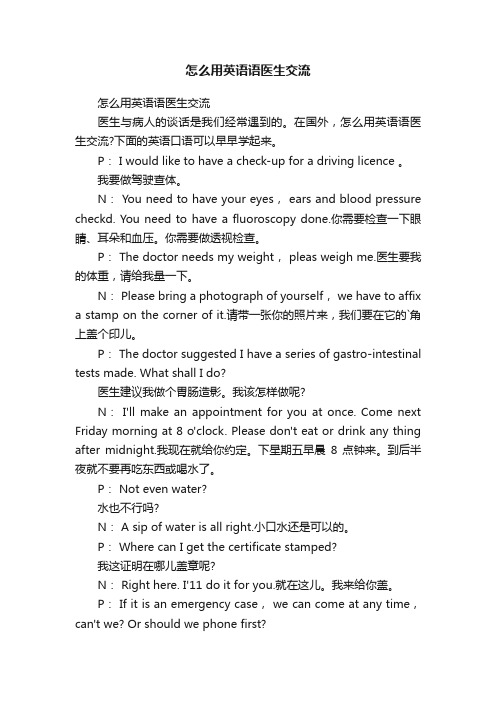
怎么用英语语医生交流怎么用英语语医生交流医生与病人的谈话是我们经常遇到的。
在国外,怎么用英语语医生交流?下面的英语口语可以早早学起来。
P: I would like to have a check-up for a driving licence 。
我要做驾驶查体。
N: You need to have your eyes, ears and blood pressure checkd. You need to have a fluoroscopy done.你需要检查一下眼睛、耳朵和血压。
你需要做透视检查。
P: The doctor needs my weight, pleas weigh me.医生要我的体重,请给我量一下。
N: Please bring a photograph of yourself, we have to affix a stamp on the corner of it.请带一张你的照片来,我们要在它的`角上盖个印儿。
P: The doctor suggested I have a series of gastro-intestinal tests made. What shall I do?医生建议我做个胃肠造影。
我该怎样做呢?N:I'll make an appointment for you at once. Come next Friday morning at 8 o'clock. Please don't eat or drink any thing after midnight.我现在就给你约定。
下星期五早晨8点钟来。
到后半夜就不要再吃东西或喝水了。
P: Not even water?水也不行吗?N: A sip of water is all right.小口水还是可以的。
P: Where can I get the certificate stamped?我这证明在哪儿盖章呢?N: Right here. I'11 do it for you.就在这儿。
如何与医生交谈 英语作文

如何与医生交谈英语作文Title: Effective Communication with Healthcare Professionals。
In today's world, effective communication with healthcare professionals is crucial for receiving the best possible care and ensuring a positive healthcare experience. Whether you are discussing symptoms, treatment options, or asking questions about your health, clear and concise communication is key. Here are some tips for engaging in productive conversations with doctors:1. Prepare in Advance: Before your appointment, take some time to think about what you want to discuss with your doctor. Write down any symptoms you've been experiencing, questions you have about your health, or concerns you wantto address. This will help you stay organized and ensurethat you cover all the important topics during your appointment.2. Be Honest and Open: It's important to be honest with your doctor about your symptoms, medical history, and lifestyle habits. This information helps them make an accurate diagnosis and develop a suitable treatment plan. Don't be afraid to discuss sensitive issues or embarrassing symptoms – healthcare professionals are trained to handle these conversations with professionalism and confidentiality.3. Ask Questions: Don't hesitate to ask questions if there's something you don't understand or if you need more information. Your doctor is there to help you, and they want you to feel informed and empowered about your health. Write down any questions you have beforehand, and don't be afraid to speak up during your appointment.4. Listen Carefully: Effective communication is a two-way street. While it's important to express your concerns and ask questions, it's also important to listen carefully to what your doctor has to say. Pay attention to their explanations, recommendations, and any instructions they provide regarding your treatment plan.5. Clarify Any Misunderstandings: If you're unsure about something your doctor said or if you have any doubts or concerns, don't hesitate to ask for clarification. It's better to address any misunderstandings upfront rather than letting them linger and potentially impact your health.6. Be Respectful and Courteous: Remember to treat your doctor and other healthcare professionals with respect and courtesy. They are dedicated professionals who are committed to providing the best possible care to their patients. By showing appreciation for their expertise and hard work, you can foster a positive and collaborative relationship with your healthcare team.7. Follow Up as Needed: After your appointment, follow up with your doctor as needed. If you have any new symptoms or if you're experiencing side effects from your treatment, don't hesitate to reach out to your doctor for guidance. Keeping the lines of communication open ensures that you receive the ongoing support and care you need.In conclusion, effective communication with healthcare professionals is essential for optimizing your healthcare experience and achieving the best possible outcomes. By preparing in advance, being honest and open, asking questions, listening carefully, clarifying any misunderstandings, being respectful and courteous, and following up as needed, you can build a strong and collaborative relationship with your doctor and receive the personalized care you deserve.。
在美国看病 如何用英文跟医生交流
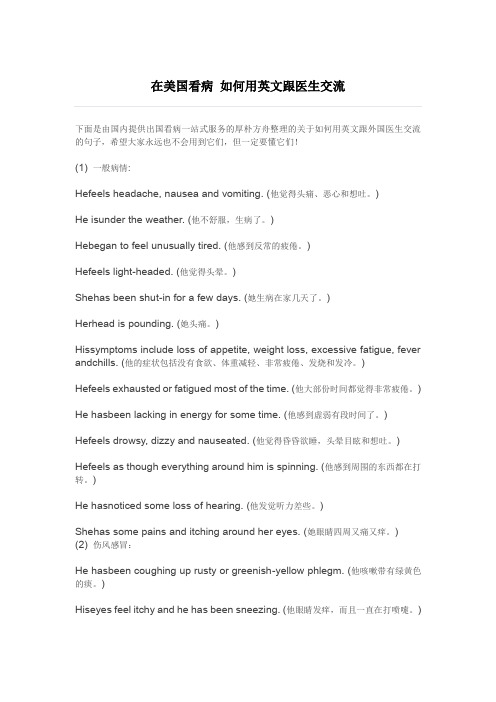
在美国看病如何用英文跟医生交流下面是由国内提供出国看病一站式服务的厚朴方舟整理的关于如何用英文跟外国医生交流的句子,希望大家永远也不会用到它们,但一定要懂它们!(1) 一般病情:Hefeels headache, nausea and vomiting. (他觉得头痛、恶心和想吐。
)He isunder the weather. (他不舒服,生病了。
)Hebegan to feel unusually tired. (他感到反常的疲倦。
)Hefeels light-headed. (他觉得头晕。
)Shehas been shut-in for a few days. (她生病在家几天了。
)Herhead is pounding. (她头痛。
)Hissymptoms include loss of appetite, weight loss, excessive fatigue, fever andchills. (他的症状包括没有食欲、体重减轻、非常疲倦、发烧和发冷。
)Hefeels exhausted or fatigued most of the time. (他大部份时间都觉得非常疲倦。
) He hasbeen lacking in energy for some time. (他感到虚弱有段时间了。
) Hefeels drowsy, dizzy and nauseated. (他觉得昏昏欲睡,头晕目眩和想吐。
)Hefeels as though everything around him is spinning. (他感到周围的东西都在打转。
)He hasnoticed some loss of hearing. (他发觉听力差些。
)Shehas some pains and itching around her eyes. (她眼睛四周又痛又痒。
) (2) 伤风感冒:He hasbeen coughing up rusty or greenish-yellow phlegm. (他咳嗽带有绿黄色的痰。
如何用英文跟外国医生交流,一定要懂它们!
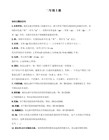
He feels lack of interest in sex.(他自觉对性的兴趣大减。)
He has difficulty starting his urine flow.(他小便不畅通。)
(2) 伤风感冒:
He has been coughing up rusty or greenish-yellow phlegm. (他咳嗽带有绿黄色的痰。)
His eyes feel itchy and he has been sneezing. (他眼睛发痒,而且一直在打喷嚏。)
He has bouts of uncontrollable coughing. (他一阵阵的咳嗽,难以控制。)
He has hoarse and has lost his voice sometimes. (他声音嘶哑,有时失声。)
He has a sore throat and a stuffy nose. (他嗓子疼痛而且鼻子不通。)
She has noticed occasional spotting of blood between periods. (在月经来的前后,她有时也发觉有滴滴达达的流血。)
She has some bleeding after intercourse. (XX后有出血。)
She feels some vaginal itching. (她感到阴部发痒。)
He feels as though everything around him is spinning. (他感到周围的东西都在打转。)
He has noticed some loss of hearing. (他发觉听力差些。)
在医院看病会与医生说哪些医学英语对话
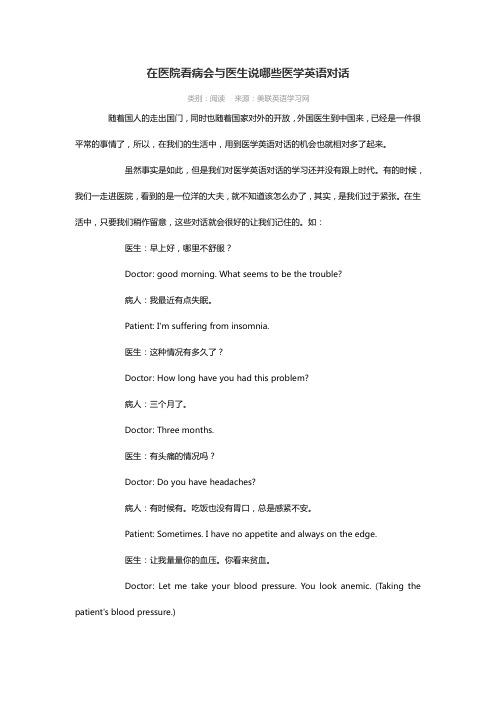
在医院看病会与医生说哪些医学英语对话类别:阅读来源:美联英语学习网随着国人的走出国门,同时也随着国家对外的开放,外国医生到中国来,已经是一件很平常的事情了,所以,在我们的生活中,用到医学英语对话的机会也就相对多了起来。
虽然事实是如此,但是我们对医学英语对话的学习还并没有跟上时代。
有的时候,我们一走进医院,看到的是一位洋的大夫,就不知道该怎么办了,其实,是我们过于紧张。
在生活中,只要我们稍作留意,这些对话就会很好的让我们记住的。
如:医生:早上好,哪里不舒服?Doctor: good morning. What seems to be the trouble?病人:我最近有点失眠。
Patient: I'm suffering from insomnia.医生:这种情况有多久了?Doctor: How long have you had this problem?病人:三个月了。
Doctor: Three months.医生:有头痛的情况吗?Doctor: Do you have headaches?病人:有时候有。
吃饭也没有胃口,总是感紧不安。
Patient: Sometimes. I have no appetite and always on the edge.医生:让我量量你的血压。
你看来贫血。
Doctor: Let me take your blood pressure. You look anemic. (Taking the patient's blood pressure.)医生:嗯,没什么好担心的。
你只不过是有点劳累过度。
Doctor: Well, there is nothing to be alarmed about. You are just a little exhausted from overwork.病人:我该怎么呢?Patient: What should I do then?医生:我想你应该多休息休息。
英文与医生交流作文范文
英文与医生交流作文范文As a language model AI, I don't have personal experience to write an essay about communicating with a doctor in English. However, I can provide a sample essay based on the most downloaded essay online.Sample Essay:Communicating with a Doctor in English。
When visiting a doctor, it is essential to be able to communicate effectively in English, especially if you are in a foreign country or if the doctor is not a native speaker of your language. Here are some tips on how to communicate with a doctor in English.1. Be clear and concise。
When describing your symptoms, be clear and concise. Use simple language and avoid medical jargon. This willhelp the doctor understand your condition better and provide the appropriate treatment.2. Ask questions。
If you do not understand something the doctor says, do not hesitate to ask questions. It is crucial to understand your diagnosis and treatment plan fully. You can also ask the doctor to explain any unfamiliar medical terms.3. Repeat or rephrase。
怎么与医生谈英语作文
怎么与医生谈英语作文When discussing medical concerns with a doctor in English, it's essential to communicate effectively toensure clarity and understanding. Here are some tips tohelp you navigate such conversations:1. Prepare in Advance: Before your appointment, make a list of the symptoms you're experiencing, any medications you're currently taking, and any questions or concerns you have. This will help you stay organized during the appointment and ensure you don't forget anything important.2. Use Simple Language: While it's essential to be accurate, try to use simple and straightforward language when describing your symptoms. Avoid medical jargon unless you're confident that both you and the doctor understand it.3. Be Honest and Open: It's crucial to be honest with your doctor about your symptoms, even if they're embarrassing or difficult to discuss. Remember, they'rethere to help you, and the more information they have, the better they'll be able to diagnose and treat you.4. Ask Questions: Don't be afraid to ask questions if you don't understand something the doctor says. It's essential that you fully understand your condition, any recommended treatments, and any potential side effects.5. Listen Carefully: Pay close attention to what the doctor is saying and ask for clarification if necessary. Repeat back important information to ensure you've understood it correctly.6. Take Notes: Consider bringing a notebook to jot down important points during the appointment. This can help you remember the doctor's instructions once you leave the office.7. Be Respectful: Remember to be polite and respectful during the appointment, even if you're feeling frustrated or anxious. A positive attitude can go a long way in fostering a good doctor-patient relationship.8. Follow Up: If you're unclear about anything discussed during the appointment, don't hesitate to follow up with the doctor or their staff. It's important to have a clear understanding of your condition and treatment plan.By following these tips, you can effectively communicate with your doctor in English and ensure that you receive the care and treatment you need. Remember, your doctor is there to help you, so don't hesitate to reach out if you have any concerns or questions.。
与外国医生交流
(1) 一般病情:He feels headache, nausea and vomiting. (他觉得头痛、恶心和想吐。
)He is under the weather. (他不舒服,生病了。
)He began to feel unusually tired. (他感到反常的疲倦。
)He feels light-headed. (他觉得头晕。
)She has been shut-in for a few days. (她生病在家几天了。
)Her head is pounding. (她头痛。
)His symptoms include loss of appetite, weight loss, excessive fatigue, fever and chills. (他的症状包括没有食欲、体重减轻、非常疲倦、发烧和发冷。
)He feels exhausted or fatigued most of the time. (他大部份时间都觉得非常疲倦。
)He has been lacking in energy for some time. (他感到虚弱有段时间了。
)He feels drowsy, dizzy and nauseated. (他觉得昏昏欲睡,头晕目眩和想吐。
)He feels as though everything around him is spinning. (他感到周围的东西都在打转。
)He has noticed some loss of hearing. (他发觉听力差些。
)She has some pains and itching around her eyes. (她眼睛四周又痛又痒。
)(2) 伤风感冒:He has been coughing up rusty or greenish-yellow phlegm. (他咳嗽带有绿黄色的痰。
)His eyes feel itchy and he has been sneezing. (他眼睛发痒,而且一直在打喷嚏。
如何与医生寒暄英语作文
如何与医生寒暄英语作文英文:As a patient, it's important to establish a good relationship with your doctor. One way to do this is by engaging in small talk or making polite conversation when you first meet with them. Here are a few examples of how you can do this:1. "Hi, Dr. Smith. How are you today?"2. "Good morning, Dr. Johnson. It's nice to see you again."3. "Hello, Dr. Wang. How's your day going so far?"These simple greetings can help break the ice and make the interaction with your doctor more comfortable. It also shows that you are respectful and considerate of their time and effort.中文:作为患者,与医生建立良好的关系非常重要。
其中一种方式就是在初次见面时进行一些小聊或者礼貌的交谈。
以下是一些例子:1. “嗨,史密斯医生。
你今天好吗?”。
2. “早上好,约翰逊医生。
很高兴再次见到你。
”。
3. “你好,王医生。
你今天过得怎么样?”。
这些简单的问候可以帮助打破僵局,使与医生的互动更加舒适。
这也表明你尊重并体贴他们的时间和努力。
- 1、下载文档前请自行甄别文档内容的完整性,平台不提供额外的编辑、内容补充、找答案等附加服务。
- 2、"仅部分预览"的文档,不可在线预览部分如存在完整性等问题,可反馈申请退款(可完整预览的文档不适用该条件!)。
- 3、如文档侵犯您的权益,请联系客服反馈,我们会尽快为您处理(人工客服工作时间:9:00-18:30)。
(1) 一般病情:He feels headache, nausea and vomiting. (他觉得头痛、恶心和想吐。
)He is under the weather. (他不舒服,生病了。
)He began to feel unusually tired. (他感到反常的疲倦。
)He feels light-headed. (他觉得头晕。
)She has been shut-in for a few days. (她生病在家几天了。
)Her head is pounding. (她头痛。
)His symptoms include loss of appetite, weight loss, excessive fatigue, fever and chills. (他的症状包括没有食欲、体重减轻、非常疲倦、发烧和发冷。
)He feels exhausted or fatigued most of the time. (他大部份时间都觉得非常疲倦。
)He has been lacking in energy for some time. (他感到虚弱有段时间了。
)He feels drowsy, dizzy and nauseated. (他觉得昏昏欲睡,头晕目眩和想吐。
)He feels as though everything around him is spinning. (他感到周围的东西都在打转。
)He has noticed some loss of hearing. (他发觉听力差些。
)She has some pains and itching around her eyes. (她眼睛四周又痛又痒。
)(2) 伤风感冒:He has been coughing up rusty or greenish-yellow phlegm. (他咳嗽带有绿黄色的痰。
)His eyes feel itchy and he has been sneezing. (他眼睛发痒,而且一直在打喷嚏。
)He has a fever, aching muscles and hacking cough. (hacking = constant) (他有发烧,筋骨酸痛和常常咳嗽。
)He coughed with sputum and feeling of malaise. (malaise = debility) (他咳嗽有浓痰,而且觉得很虚弱。
)He gets a cold with a deep hacking cough. (他伤风咳嗽。
)He has a headache, aching bones and joints. (他头痛,骨头、关节也痛。
)He has a persistent cough. (他不停地在咳。
)He has bouts of uncontrollable coughing. (他一阵阵的咳嗽,难以控制。
)He has hoarse and has lost his voice sometimes. (他声音嘶哑,有时失声。
)He has a sore throat and a stuffy nose. (他嗓子疼痛而且鼻子不通。
)His breathing is harsh and wheezy. (他呼吸时,有气喘似的呼哧呼哧作响。
)He has a stabbing pain that comes on suddenly in one or both temples. (有时突然间太阳穴刺痛。
)He has a runny nose, sneezing or a scratchy throat. (他流鼻水,打喷嚏和喉咙沙哑。
)(3) 女性疾病:She has noticed one lump in her breast. (她发觉乳房有个肿块。
)There is a hard, swollen lump on her right breast. (她右乳房有肿块。
)Her left breast is painful and swollen. (她左乳房疼痛且肿大。
)She has heavy bleeding with her periods. (她月经来的很多。
)Her vaginal discharge is white or greenish-yellow and unpleasant smelling. (她阴道分泌物带白色或绿黄色,而且气味不好。
)She has noticed occasional spotting of blood between periods. (在月经来的前后,她有时也发觉有滴滴达达的流血。
)She has some bleeding after intercourse. (性交后有出血。
)She feels some vaginal itching. (她感到阴部发痒。
)She has painful periods and abnormal vaginal discharge. (她月经来时疼痛,而且阴道有不正常的分泌物。
)(4) 手脚疾病:His both hands and feet ache all over. (他两手两脚都很酸痛。
)He has pain on the sole of his feet. (他脚底很痛。
)There is a wart-like lump on the sole of right foot. (我右脚底有个像肉疣般的硬块。
)His ankles look puffy and they pit when he presses them with his finger. (pit = small dent form;句里的they 和them 都是指ankles)(他的足踝好象肿了,用手按,就有小坑痕。
)The pain in his left foot is accompanied by redness and swelling. (左脚酸痛,并有红肿。
)The joints near his fingernails and knuckles look swollen. (指头和指节旁边的关节,似乎有肿大。
)He has numbness and tingling in his hands and fingers. (他的手和指头感到麻木和刺痛。
)His legs become painful following strenuous exercise. (激烈运动后,他的腿就痛。
)His knee is misshapen or unable to move. (他的膝盖有点畸形,也不能动。
)There are some swellings in his armpit. (他的腋窝肿大。
)He is troubled with painful muscles and joints. (他的筋骨和关节都痛。
)She is troubled by the pains in the back and shoulders. (她的后背和肩膀都痛。
)His knee has been bothering him for some time. (他的膝盖不舒服,已有一段时间了。
)(5) 睡眠不好:He is sleeping poorly.(他睡不好)He has difficulty in sleeping, inability to concentrate.(他不易入睡,也难集中精神。
)It is usually hard for her to fall asleep when she goes to bed at night.(她晚上就寝,很难入睡。
)He wakes during the night or early morning and finds it difficult to fall asleep again.(他晚间或清早醒来后,再也不能入睡。
)He has nightmares occasionally.(他有时做噩梦。
)(6) 男性疾病:He urinates more frequently than usual.(他小便比平时多。
)He has difficulty controlling his bladder.(他很难控制小便。
)(bladder:膀胱)There are some lumps on his testicles. (他的睪丸有些硬块。
)He has had burning or pain when he urinates.(他小便时感到发烫和疼痛。
)He is passing less urine than usual.(他小便比平时少。
)He has had painless swelling in his scrotum.(他的阴囊有不痛的肿大。
)He feels lack of interest in sex.(他自觉对性的兴趣大减。
)He has difficulty starting his urine flow.(他小便不畅通。
)His urine stream is very weak and slow.(他小便流动得很慢很弱。
)He dribbles a little urine after he has finished urinating.(他小便后,还会有少量零星地滴下。
)He has had some discharge from his penis.(他的阴茎排出一些流脓。
)His urine is cloudy and it smells strong.(他的小便混浊,而且气味不好。
)He has a dull heavy ache in the crotch.(他的胯部感到隐痛。
)He has a small leakage of urine when he coughs or sneezes.(他咳嗽或打喷嚏时,会有点泄尿。
)He has trouble urinating.(他小便有困难。
)(7) 呼吸方面:His breathing has become increasingly difficult.(他呼吸越来越困难。
)He has to breathe through his mouth.(他要用口呼吸。
)He is short of breath, even when he has not been exercising, he is breathless.(他喘气;即使不运动,他也是上气不接下气。
